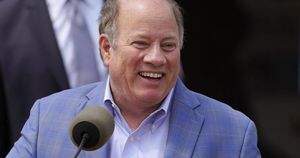South Korea's entertainment industry, famed for its vibrant music, tantalizing dramas, and sparkling celebrities, is currently entangled in several controversies and scandals. High-profile incidents involving celebrities have raised questions about the personal conduct of stars and the repercussions they face when they step out of line.
One of the most prominent stories buzzing through social media is of basketball player Heo Woong, who recently returned to the spotlight after being cleared of sexual assault charges. On November 13, he shared a heartfelt video on his social media, showcasing the gifts he received from fans, expressing his gratitude with blue heart emojis. This after being acquitted on September 9 when the police concluded the investigation against his former girlfriend, named as A, found no substantial proof for the allegations of attempted rape. Heo's agency, Keyplayer Agency, stated they would strive to present more mature and responsible behavior moving forward.
It gets more complicated when digging back to the details surrounding the accusations. Reportedly, A backed her claims with allegations of extortion against Heo, claiming he tried to pay her 300 million won to keep quiet about their relationship's fallout. Meanwhile, Heo alleges A threatened him with exposure on social media, claiming they had some sort of romantic entanglement. He faced these accusations head-on, later filing charges of false accusation against A's lawyer, claiming they had advised her to stick to her story to attain her goals.
This convoluted tale has not only drawn attention due to its nature but also flared public interest as Heo tries to reclaim his public image amid the scandal. It exemplifies the intense scrutiny and moral expectations celebrities face within South Korea's demanding entertainment industry.
Following Heo's example, music star Kim Ho Joong is similarly challenged but faced much harsher consequences. On the same day, his case surfaced as he was sentenced to two years and six months for charges associated with dangerous driving causing injuries as well as attempted destruction of evidence following his hit-and-run incident last May. His story unfolded horrifyingly when he went through legal scuffles with serious ramifications for his career.
People have debated the discrepancies within these two cases. Critics pointed out the unequal treatment of celebrities by the judicial system. What seems to trouble the public more is how, during heated moments, both men urged the courts for leniency but ended on vastly different sides of the law. Regardless of relative fame, one faced penalties deemed less harsh compared to his partner when both claims involved reckless behaviors.
This disparity has ignited discussions on social media, questioning if fame influences judicial outcomes within the celebrity circles of South Korea. It raises concerns about accountability and sets off alarm bells about justice served to the affluent versus average citizens who partake less public lives.
Fans reacted vigilantly; some lauded Heo for being exonerated, causing spikes of support across various platforms. Still, many were outraged at Kim's case, pointing toward systemic biases, leading some to wonder if reform is due within South Korea's entertainment ecosystem.
The entertainment world is also facing scrutiny due to several other recent incidents linked to celebrity behavior. Recently, singer Jessi faced backlash for what many termed as her unacceptable behavior during fan interactions, igniting discussions about the culture surrounding celebrity and fan dynamics. These incidents constantly surface, where the boundaries between personal actions and public personas blur, leaving the media and fans to grapple with their expectations.
This whirlwind of scandals has inadvertently opened discussions about the K-Pop idol culture—time after time, many faces hold accountability high among fans, sometimes losing sight of their originality as entertainers. This expectation can lead to strict personal interference, pushing stars to exhibit perfection publicly.
Several idols were accused recently of unpleasant behavior with their fans; whether it is public embarrassment or verbal abuse, it raises concerns about how these figures deal with criticism or expressing negative feelings. Some stars seemed to show no remorse for their actions and were seemingly disturbed by backlash, indicating they were oblivious to the consequences of their status.
This changing tide reveals society's increasing resilience against accepting flawed personas. Perhaps it suggests the modern audience emphasizes the importance of sincere endeavors within their idol engagements, making them accountable beyond just their performance prowess.
The effects of some of these scandals hit home particularly hard for fans who invested emotionally and financially—sometimes even risked their social standing to support these stars. With pressure building, the gap between public ideals and personal realities expands, spiraling down to intense social media scrutiny where once-respected icons find their likeness tarnished.
But it’s not merely confined to individuals; entire groups face the backlash. Various K-Pop groups have recently pulled from public appearances due to scandals involving personal relationships or breaches of conduct. Audiences have shown they seek integrity and honesty from their beloved idols and do not shy away from voicing their discontent when things go awry.
Despite various societal rumbles, South Korea's entertainment industry is known for its resilient spirit and unwavering drive—stars like Heo Woong strive to navigate this complex web of expectations and controversies. Still, countless challenges lurk on the horizon with every starlit interaction.
These voids between celebrity life and their human elements immerse fans ever-deeply and staggeringly real. Scandals grip fans emotionally, showcasing how the lives of these high-profile figures intertwine heavily with the public perception. This teaches them the harsh lessons of enduring the fiery scrutiny calling for change, both on personal levels, to burn their bridges, and across the entertainment industry, to forge new paths.
Whether these events will bring about lasting change remains uncertain, but what isn't ambiguous is the powerful narrative they weave about behavior, consequences, and the fiery stakes involved.
So, can we hope for progress or fresh heartbreaks as they emerge? Only time will unravel these sensational tales against South Korea's entertainment backdrop, and the audience watches, aghast, waiting for the next turn. What’s crystal clear, though: stars must perform not just for the stage but off it as well, for their light will flicker under scrutiny, and the stakes couldn’t be any higher.
For now, fans remain rooted, reflects the phantom expectations of perfection intertwined with celebrity persona. The debates rage on, lessons learn from both sides of the spectrum, tasked to evolve within this standard where golden rules must reign if the glimmer of stardom is desired.



